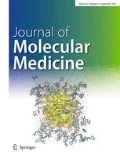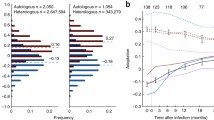Abstract
The propensity of HIV-1 for genetic variation, a consequence of error-prone reverse transcription combined with high rates of replication, is thought to contribute to the establishment of persistent infection in the host despite the presence of a vigorous antiviral immune response. Protective immunity to viruses is mediated primarily by cytotoxic T lymphocytes, which recognize viral peptides of 8–11 amino acids bound to major histocompatibility complex class I molecules on the surface of infected cells. In this review we examine the mechanisms by which mutation within peptide antigen-encoding regions of the viral genome enables HIV-1 to evade recognition by virus-specific cytotoxic T lymphocytes. The discussion is relevant to other genetically unstable viruses and more generally to intracellular pathogens of variable antigenicity.
Similar content being viewed by others
Author information
Authors and Affiliations
Additional information
Received: 25 February 1998 / Accepted: 5 May 1998
Rights and permissions
About this article
Cite this article
Price, D., Meier, UC., Klenerman, P. et al. The influence of antigenic variation on cytotoxic T lymphocyte responses in HIV-1 infection. J Mol Med 76, 699–708 (1998). https://doi.org/10.1007/s001090050270
Issue Date:
DOI: https://doi.org/10.1007/s001090050270




